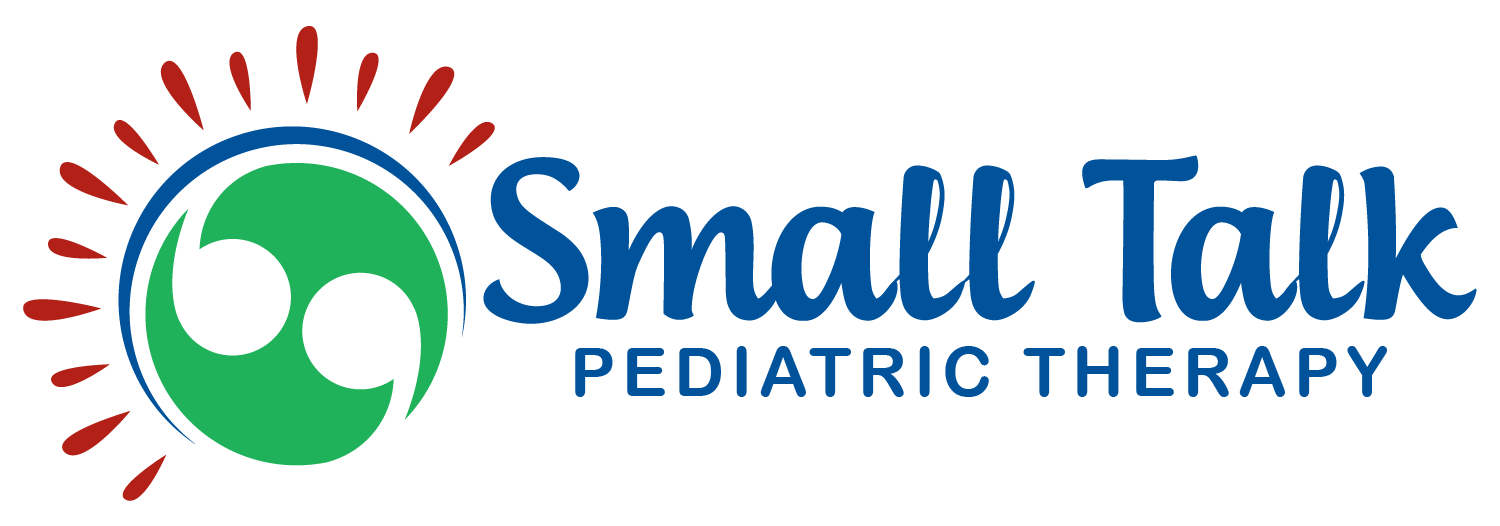At Small Talk Pediatric Therapy we provide a friendly, engaging environment which drives children to successfully understand and use language independently to become successful communicators. Small Talk prides ourselves on working with families and children to help establish and implement appropriate communication goals and strategies.
Speech and language therapy can help improve:
- Comprehension and expression through language
- Speech sound production
- Executive function skills
- Auditory skills
As a parent or caregiver, you are integral to the success of your child’s treatment. In addition to participating in therapy, you will learn strategies to help your child communicate effectively with those around them.
When should you seek help?
Parents should seek out a speech language therapist if they have any concerns regarding their child’s ability to listen, understand, communicate and play with others.
When should you seek help?
We strongly recommend that you seek help from a speech-language professional if your child:
By 12 months
- doesn’t babble with changes in tone – e.g. dadadadadadadadada
- doesn’t use gestures like waving “bye bye” or shaking head for “no”
- doesn’t respond to her/his name
- doesn’t communicate in some way when s/he needs help with something
By 15 months
- doesn’t understand and respond to words like “no” and “up”
- says no words
- doesn’t point to objects or pictures when asked “Where’s the…?
- doesn’t point to things of interest as if to say “Look at that!” and then look right at you
By 18 months
- doesn’t understand simple commands like “Don’t touch”
- isn’t using at least 20 single words like “Mommy” or “up”
- doesn’t respond with a word or gesture to a question such as “What’s that? or “Where’s your shoe?”
- can’t point to two or three major body parts such as head, nose, eyes, feet
By 24 months
- says fewer than 100 words
- isn’t consistently joining two words together like “Daddy go” or “ shoes on”
- doesn’t imitate actions or words
- doesn’t pretend with toys, such as feeding doll or making toy man drive toy car
By 30 months
- says fewer than 300 words
- isn’t using action words like “run”, “eat”, “fall”
- isn’t using some adult grammar, such as “two babies” and “doggie sleeping”
3-4 years
- doesn’t ask questions by 3 years
- isn’t using sentences (e.g., “I don’t want that” or “My truck is broken”) by three years
- isn’t able to tell a simple story by four or five years
If you’ve noticed one or more of these warning signs in your child, it’s important that you take action right away to ensure that your child receives the help they need.
Speech and language therapy provides personalized services for pediatric patients presenting with simple to complex speech and language based deficits.
Speech therapy is available for children who experience difficulty in any of the following areas:
- Language Delays/ Disorders (Receptive and Expressive Language)
- Autism Spectrum Disorder/Pervasive Developmental Disorder/Asperger’s
- Articulation Delays/Disorders
- Phonological Disorders
- Apraxia of Speech
- Social Skills/Pragmatics
- Tongue Thrust
- Fluency Disorders
Small Talk Pediatric Therapy offers the following services:
- Initial Screenings
- Comprehensive Speech and Language Evaluations
- Individualized Treatment Plans
- Individual Therapy Sessions
- Collaboration with schools and other professionals
